Related Research Articles

Home economics, also called domestic science or family and consumer sciences, is a subject concerning human development, personal and family finances, consumer issues, housing and interior design, nutrition and food preparation, as well as textiles and apparel. Much less common today, it was, and is, mostly taught in secondary school or high school.

Joseph Eugene Stiglitz is an American New Keynesian economist, a public policy analyst, and a full professor at Columbia University. He is a recipient of the Nobel Memorial Prize in Economic Sciences (2001) and the John Bates Clark Medal (1979). He is a former senior vice president and chief economist of the World Bank. He is also a former member and chairman of the Council of Economic Advisers. He is known for his support for the Georgist public finance theory and for his critical view of the management of globalization, of laissez-faire economists, and of international institutions such as the International Monetary Fund and the World Bank.

Buddhist economics is a spiritual and philosophical approach to the study of economics. It examines the psychology of the human mind and the emotions that direct economic activity, in particular concepts such as anxiety, aspirations and self-actualization principles. In the view of its proponents, Buddhist economics aims to clear the confusion about what is harmful and what is beneficial in the range of human activities involving the production and consumption of goods and services, ultimately trying to make human beings ethically mature. The ideology's stated purpose is to "find a middle way between a purely mundane society and an immobile, conventional society."

The capability approach is a normative approach to human welfare that concentrates on the actual capability of persons to achieve lives they value rather than solely having a right or freedom to do so. It was conceived in the 1980s as an alternative approach to welfare economics.
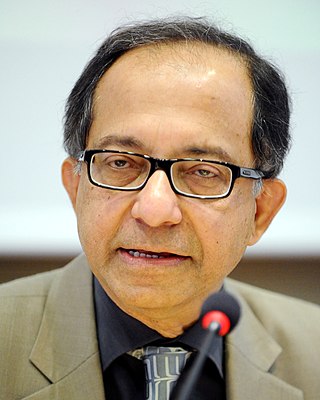
Kaushik Basu is an economist who was Chief Economist of the World Bank from 2012 to 2016 and Chief Economic Adviser to the Government of India from 2009 to 2012. He is the C. Marks Professor of International Studies and Professor of Economics at Cornell University, and academic advisory board member of upcoming Plaksha University. He began a three-year term as President of the International Economic Association in June 2017. From 2009 to 2012, during the United Progressive Alliance's second term, Basu served as the Chief Economic Adviser to the Government of India. Kaushik Basu is winner of the Humboldt Research Award 2021.
Sakiko Fukuda-Parr is a development economist who has gained recognition for her work with the United Nations Development Programme (UNDP) and for her writing in publications including the Journal of Human Development and Capabilities, which she founded.
Human development involves studies of the human condition with its core being the capability approach. The inequality adjusted Human Development Index is used as a way of measuring actual progress in human development by the United Nations. It is an alternative approach to a single focus on economic growth, and focused more on social justice, as a way of understanding progress
Holger Ziegler is a professor of social work at the Faculty of Education at Bielefeld University. He was a member of the Research Training Group Youth Welfare and Social Services in Transition of the German Research Foundation (2000–2003), Fellow at the Department of Criminology at Keele University (UK) (2003) and Assistant Professor of Special Education at Westfälische Wilhelms University Münster. He has been a member of the academic advisory board of the German Soccer League since 2010; of the North Rhine-Westphalia research school Education and Capability and member of the Human Development and Capability Association (HDCA) and since 2010 speaker of the HDCA Thematic Group on Education.

Ernest Aryeetey, is the secretary-general of the African Research Universities Alliance (ARUA) and a former vice-chancellor of the University of Ghana. Prior to his appointment as vice-chancellor, he was a senior fellow and director of the Africa Growth Initiative at the Brookings Institution, Washington, D.C. He was also director of the Institute of Statistical, Social and Economic Research (ISSER) of the University of Ghana, Legon for the period February 2003 to January 2010.

Stefano Zamagni is an Italian economist. Born in Rimini, Zamagni is Professor of Economics at the University of Bologna. Zamagni is also a fellow of the Human Development and Capability Association and President of the Pontifical Academy of Social Sciences.
Henry Shattuck Richardson is an American philosopher, author, Professor of Philosophy at Georgetown University, and Senior Research Scholar at the Kennedy Institute of Ethics.
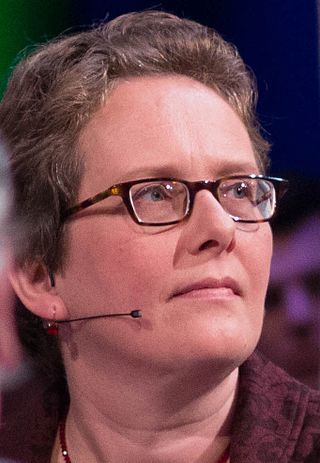
Ingrid A. M. Robeyns holds the Chair Ethics of Institutions at Utrecht University, Faculty of Humanities and the associated Ethics Institute.
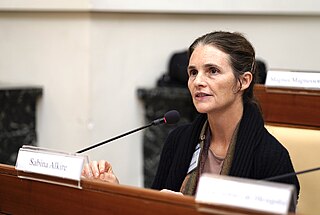
Sabina Alkire is an American academic and Anglican priest, who is the director of the Oxford Poverty and Human Development Initiative (OPHI), an economic research centre within the Oxford Department of International Development at the University of Oxford, England, which was established in 2007. She is a fellow of the Human Development and Capability Association. She has worked with organizations such as the Commission on the Measurement of Economic Performance and Social Progress, the United Nations Human Development Programme Human Development Report Office, the European Commission, and the UK's Department for International Development.

The International Association for Feminist Economics (IAFFE) is a non-profit international association dedicated to raising awareness and inquiry of feminist economics. It has some eight hundred members in over 90 countries. The association publishes a quarterly journal entitled Feminist Economics.
David A. Crocker, is Research Professor in the School of Public Policy, at the University of Maryland, he is also the founder and former president of the International Development Ethics Association (IDEA). His work has been cited by the United Nations Human Development Report.
Sanjiv M. Ravi Kanbur, is T.H. Lee Professor of World Affairs, International Professor of Applied Economics, and Professor of Economics at Cornell University. He worked for the World Bank for almost two decades and was the director of the World Development Report.

Osita Ogbu, OON is a professor of development economics at the University of Nigeria. He was the Minister of National Planning in Nigeria from 2005 to 2006, and former Chief Economic Advisor to the President of Nigeria. He once served as the Executive Director of the African Technology Policy Studies Network, Nairobi, after having served as Senior Program Specialist-Economics of the International Development Research Centre (IDRC), Canada and Consultant Research Economist of the World Bank, Washington D.C. He is also a former visiting fellow of the Brookings Institution's Africa Growth Initiative. Osita Ogbu was the Director of the Institute for Development Studies, University of Nigeria, Enugu Campus. Aside from having served as former chairman of the Governing Council of the National Institute for Economic and Social Research (NISER), he is the Chief Executive Officer of the African Development Solutions International [ADSI] and a member of the Global Advisory Board of the Institute for Governance and Economic Transformation (IGET).
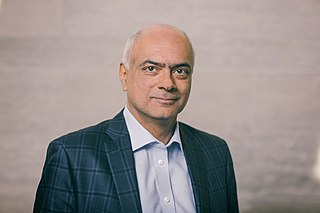
Rohinton P. Medhora is a Canadian economist. His fields of expertise are monetary and trade policy, international economic relations, and development economics. He is a Centre for International Governance Innovation (CIGI) distinguished fellow, former president of CIGI and professor of practice at McGill University's Institute for the Study of International Development.
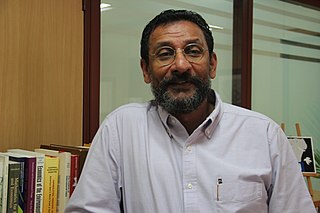
Anantha Duraiappah has served as the inaugural director of the Mahatma Gandhi Institute of Education for Peace and Sustainable Development (MGIEP), a UNESCO Category 1 Research Institute in the Asia Pacific since 2014. He is also currently visiting professor in the Urban Institute at the Kyushu University, Japan, former visiting professor, University of Tokyo, Japan, a fellow of The World Academy of Sciences (TWAS), a fellow and member, World Academy of Arts and Sciences and a member of the advisory board, Journal - Indian Society of Ecological Economics. He has previously worked in senior positions at the United Nations University, United Nations Environment Progamme, International Institute for Sustainable Development and was previously an academic at Vrije Universiteit, National University of Singapore and European University Institute. Dr. Duraiappah is also formally trained in the modern Japanese martial art of Kendo.
References
- ↑ "Human Development and Capability Association Launched". International Institute for Sustainable Development. 3 September 2004. Archived from the original on 21 June 2015. Retrieved 21 June 2015.
- 1 2 "Welcome to the HDCA". Human Development and Capability Association. Retrieved 21 June 2015.
- ↑ "Publications: An introduction to the human development and capability approach: freedom and agency". International Development Research Centre (IDRC) . Retrieved 21 June 2015.
- ↑ "Election results for HDCA Executive Council". Human Development & Capability Association. 15 May 2013. Retrieved 8 April 2014.
- ↑ "HDCA history and mission". Human Development & Capability Association. Retrieved 8 April 2014.
- ↑ "New HDCA Executive Council members elected!". Human Development & Capability Association. 8 June 2015. Retrieved 21 June 2015.
- ↑ "HDCA Fellows". Human Development & Capability Association. Retrieved 28 December 2015.
- ↑ "Paul Anand". Archived from the original on 2014-04-08. Retrieved 2014-04-08.
- ↑ "P B Anand". Archived from the original on 2014-04-08. Retrieved 2014-04-08.
- ↑ Sudhir Anand
- ↑ Proochista Ariana
- ↑ Mario Biggeri
- ↑ Andrea Brandolini
- ↑ Tania Burchardt
- ↑ Satya Chakravarty
- ↑ Enrica Chiappero-Martinetti
- ↑ "David Clark". Archived from the original on 2014-04-08. Retrieved 2014-04-08.
- ↑ Jay Drydyk
- ↑ Jean Luc Dubois
- ↑ "Anantha Duraiappah". Archived from the original on 2014-04-08. Retrieved 2014-04-08.
- ↑ James E. Foster
- ↑ Wulf Gaertner
- ↑ "Des Gasper". Archived from the original on 2013-10-23. Retrieved 2014-04-08.
- ↑ "Jacqueline Ann Goldin". Archived from the original on 2014-04-08. Retrieved 2014-04-08.
- ↑ John Hammock
- ↑ "Solava Ibrahim". Archived from the original on 2013-07-09. Retrieved 2014-04-08.
- ↑ "Javier Iguiñiz". Archived from the original on 2014-03-29. Retrieved 2014-04-08.
- ↑ Stephan Klasen
- ↑ Jaya Krishnakumar
- ↑ Barbara Ky
- ↑ Ortrud Lessmann
- ↑ Luis Felipe Lopez-Calva
- ↑ Henk Manschot
- ↑ "Guillermo Bornemann Martinez". Archived from the original on 2014-04-08. Retrieved 2014-04-08.
- ↑ "Mark McGillivray". Archived from the original on 2014-02-23. Retrieved 2014-04-08.
- ↑ Allister McGregor
- ↑ Zina Nimeh
- ↑ Farhad Noorbakhsh
- ↑ Avner Offner
- ↑ Ilse Oosterlaken
- ↑ Siddiqur R. Osmani
- ↑ Antonella Picchio
- ↑ Antoanneta Potsi
- ↑ Mozaffar Qizilbash
- ↑ Sanjay Reddy
- ↑ José Manuel Roche
- ↑ Erik Schokkaert
- ↑ Randy Spence
- ↑ "Diana Strassmann". Archived from the original on 2013-11-05. Retrieved 2014-04-08.
- ↑ Subbu Subramanian
- ↑ Lorella Terzi
- ↑ Graciela Tonon
- ↑ "John Toye". Archived from the original on 2014-04-08. Retrieved 2014-04-08.
- ↑ Elaine Unterhalter
- ↑ Sridhar Venkatapuram
- ↑ Andrea Vigorito
- ↑ Polly Vizard
- ↑ Melanie Walker
- ↑ Gareth Wall
- ↑ "Maria Monica Wihardja". Archived from the original on 2014-04-08. Retrieved 2014-04-08.